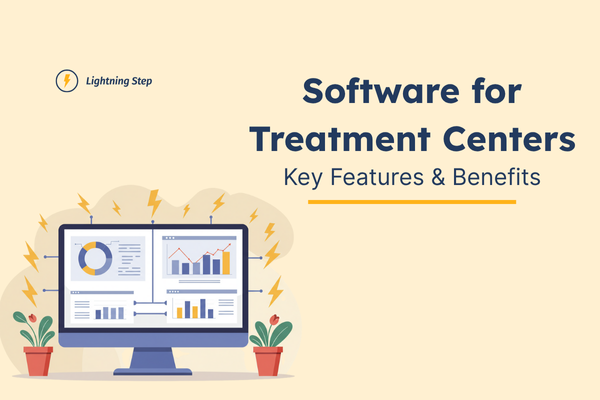
Technology is changing how treatment centers operate. Paper charts and manual processes are giving way to digital solutions that make patient care better and operations smoother. Software for treatment centers addresses specific challenges these facilities face daily - from tracking patient progress to managing complex billing requirements.
Treatment centers deal with unique workflows that generic medical software often can't handle. The right specialized system can transform how you deliver care and run your facility. Let's explore what makes treatment center software essential, what features to look for, and how it can benefit your organization.
Treatment center software is a specialized digital platform designed to manage the clinical, administrative, and financial aspects of behavioral health and addiction treatment facilities. Unlike general healthcare systems, it addresses the specific needs of treatment centers including:
This software has evolved from basic electronic record-keeping to comprehensive platforms that connect every aspect of a treatment center's operations. Modern solutions like Behavioral Health EHR & EMR Software | Lightning Step combine multiple functions into unified systems, eliminating the need to juggle separate programs for different tasks.
Effective software for treatment centers should include these essential capabilities:
Digital intake forms, treatment planning tools, and progress tracking help you maintain comprehensive patient records. Look for systems with customizable assessment tools and treatment plan templates specific to behavioral health.
Advanced scheduling functions should manage both individual and group sessions while tracking staff availability. Some platforms offer internal availability features that give providers control over their schedules while maintaining facility-wide visibility.
Specialized billing tools handle the complex reimbursement landscape of behavioral health, including insurance verification, claims submission, and payment tracking. Look for systems with payment plan features to help manage self-pay arrangements.
Built-in compliance safeguards ensure your documentation meets regulatory requirements. This becomes particularly valuable during accreditation processes with organizations like JCAHO, as all-in-one systems can significantly simplify audits.
Data visualization tools help track key performance indicators, patient outcomes, and business metrics. These insights drive better decision-making and program improvements.
The ability to connect with other healthcare systems, pharmacies, and third-party services creates a seamless information flow. For example, medication management through integrations like DoseSpot can streamline prescribing processes.
Flexible systems adapt to your specific workflows rather than forcing you to change your processes. Custom form builders allow you to create documentation that matches your exact clinical and administrative needs.
Digital tools enhance treatment quality through:
Automation streamlines daily tasks:
The right software improves your bottom line through:
Treatment centers with advanced technology stand out by offering:
The impact of comprehensive software extends throughout your organization:
From first contact to discharge, integrated software creates a cohesive experience. Patients benefit from smoother admissions, consistent communication, and coordinated care planning. Transforming the entire patient journey with connected systems eliminates gaps that can occur when using separate platforms.
With all patient information in one place, clinicians make better-informed decisions. Treatment history, medication records, and progress notes are instantly accessible, supporting evidence-based care.
Staff spend less time on paperwork and more time on patient care. Automated workflows handle routine tasks like appointment reminders, form completion, and basic documentation.
Integrated messaging and notification systems keep everyone informed. Care teams collaborate more effectively, and patients receive timely updates about their treatment.
Automated compliance checks and standardized documentation reduce risk. The system can flag missing information, track required assessments, and maintain audit trails.
Finding the best fit requires careful evaluation:
Take these steps before making a decision:
The most valuable systems combine Customer Relationship Management (CRM), Electronic Medical Records (EMR), and Revenue Cycle Management (RCM) into a single platform. This approach eliminates duplicate data entry and provides a complete view of operations.
A mid-sized addiction treatment center implemented an integrated CRM/EMR system and saw admissions processing time drop by 65%. Staff could quickly verify insurance, collect patient information, and initiate clinical assessments in one workflow. This reduced patient wait times and captured more billable services during the intake process.
A mental health facility adopted AI-powered documentation tools and reduced clinician paperwork time by over 12 hours per month per provider. This translated to either seeing more patients or improving work-life balance for clinical staff.
After implementing specialized billing software, a behavioral health network increased clean claim rates from 75% to 93% and reduced days in accounts receivable by 40%. The automated verification and claim scrubbing features caught potential issues before submission.
The technology landscape continues to evolve:
AI assistants are beginning to transform clinical documentation, predictive analytics, and even treatment recommendations. These tools analyze patterns in patient data to suggest interventions or flag potential issues before they become serious.
Virtual care capabilities are becoming standard features rather than add-ons. Future systems will seamlessly blend in-person and remote treatment options within the same platform.
As providers and patients increasingly use smartphones and tablets, software is evolving to offer full functionality on mobile devices rather than just desktop computers.
Newer systems are breaking down data silos between different healthcare providers. This allows for better coordination between treatment centers, primary care, and other specialists involved in patient care.
Software for treatment centers has evolved from a convenience to a necessity. The right system can transform how you deliver care, manage operations, and grow your organization. By digitizing and integrating your workflows, you can focus more on patient outcomes and less on administrative tasks.
When evaluating options, look beyond basic features to find a solution that truly understands the unique challenges of behavioral health treatment. Consider how the system will grow with your organization and adapt to changing healthcare requirements.
The investment in specialized technology pays dividends through improved patient care, operational efficiency, and financial performance. As you navigate this decision, remember that the goal isn't just to digitize existing processes but to transform how your treatment center functions.
Take the next step by researching options that align with your specific needs, requesting demonstrations, and talking with other treatment centers about their experiences. Your technology choices today will shape your ability to provide effective care tomorrow.



